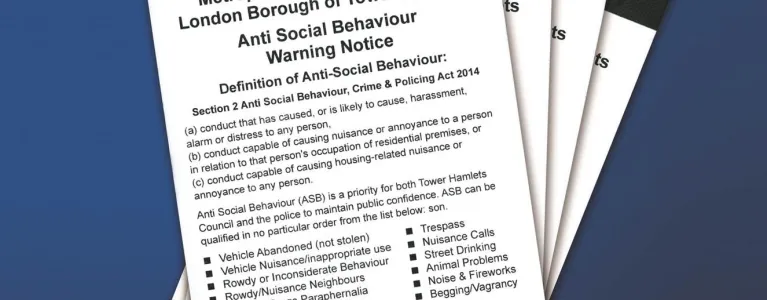
Nuisance noise, animal problems, street drinking, littering or drugs paraphernalia, abandoned vehicles, misuse of fireworks, begging or vagrancy, noisy or nuisance neighbours.
- Antisocial behaviour is classified into three main categories: personal antisocial behaviour; nuisance antisocial behaviour; and environmental antisocial behaviour.
- Despite the legal definition of antisocial behaviour, there is often confusion about what constitutes antisocial behaviour.
- Reports of antisocial behaviour have risen over recent years.
- Data on antisocial behaviour in London is inconsistent.
- Tackling antisocial behaviour places significant demands on the Met and other statutory agencies in London.
- Cost cutting has had an impact on the response to antisocial behaviour. Expertise is being lost and cross-agency working abandoned.
A report published today by the London Assembly Police and Crime Committee – ‘Respecting others: tackling antisocial behaviour in London’ – examines the issue of antisocial behaviour.
The report recommends:
- The Met must evaluate the benefits of rolling out Antisocial Behaviour Warning Notices in all London boroughs.
- MOPAC should introduce a performance management framework that collates and reports on data from the Met, local authorities and housing providers.
- Victims of antisocial behaviour are seen as second rate to victims of crime. The Mayor must lobby the Government to extend the remit of the Victims Commissioner and the use of MOPAC commissioning powers to include victims of antisocial behaviour and for funding that reflects the needs of victims of antisocial behaviour in London.
- The Community Remedy and Community Trigger were designed to empower victims of antisocial behaviour. MOPAC must increase awareness and promote the use of these powers.
Chairman of the Police and Crime Committee, Steve O’Connell AM, said:
“Just because antisocial behaviour is difficult to define it should not mean that agencies give up on dealing with it. A clear understanding is important to ensure action and the correct response. Without a standard definition or understanding of what antisocial behaviour is, people will get lost, slip between the gaps and get shuffled around.
It needs to be high on the agenda for the police, housing providers and all boroughs in London.
We are unclear as to how the Mayor is leading the response to antisocial behaviour and believe he should clarify his commitment to tackling it by supporting local partnerships to better understand what is happening in the capital and help shape London’s response.”
The report will be launched at City Hall in Committee Room 4.
Date and time: Thursday, 18 January, 2:30-4:00pm
Address: Committee Room 4, City Hall, The Queen’s Walk, More London, SE1 2AA
Speakers:
Steve O’Connell, Chairman, Police and Crime Committee
- Paul Dunn MBE, Antisocial Behaviour Adviser
- Darren Baxter, Inspector Neighbourhood Task Force and Partnership, Tower Hamlets Borough Operational Command Unit, Metropolitan Police
- Shirley Holmes, Community MARAC Coordinator, London Borough of Brent
- Jo Grimshaw, Antisocial Behaviour Manager, Surrey Police
- Janine Green, Managing Director, Resolve ASB
MEDIA ARE INVITED TO ATTEND BY PRIOR ARRANGEMENT
Please notify Lisa Lam in advance on 020 7983 4067 or at [email protected]
Follow us @LondonAssembly and tweet about the report using #AssemblyPolice and #TacklingASB
Related documents
Respecting others: tackling antisocial behaviour in London report
Notes to editors
- ‘Respecting others: tackling antisocial behaviour in London’ report (attached).
- Steve O’Connell AM, Chairman of the Police and Crime Committee, is available for interview – see contact details below.
- As well as investigating issues that matter to Londoners, the London Assembly acts as a check and a balance on the Mayor.
For media enquiries, please contact Lisa Lam on 020 7983 4067. For out of hours media enquiries, call 020 7983 4000 and ask for the London Assembly duty press officer. Non-media enquiries should be directed to the Public Liaison Unit on 020 7983 4100.